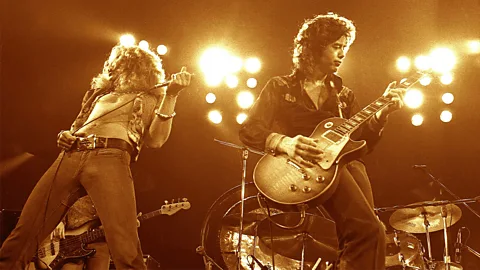 Getty Images
Getty ImagesBecoming Led Zeppelin is a new authorised documentary that tells the “untold story” of the band, who despite achieving global influence and legendary status, are difficult to categorise.
Rock’s mightiest anthems, and the tales surrounding them, tend to be continually replayed – and sometimes, their power fades over time. Since their 1968 formation, though, Led Zeppelin’s legendary status, and mythology, has particularly endured. The British quartet – driven visionary guitarist/producer Jimmy Page, extravagantly swaggering vocalist Robert Plant, and the poetic powerhouse rhythm section of bassist John Paul Jones and drummer John Bonham – have remained instantly recognisable and globally influential, yet tricky to pin down. Their multi-million-selling catalogue is laced with blues, hard rock, folk fables, African, Asian and Latin grooves, macho bombast and avant-garde flair. They gained a rep for scandalous excess, while mostly shunning the press – but now Becoming Led Zeppelin, their first officially authorised documentary, promises to capture the band’s “untold story” for posterity.
This film’s long-awaited cinema release follows a “work in progress” screening at the Venice Film Festival in 2021. Becoming Led Zeppelin also forms a natural progression for filmmakers Bernard MacMahon and Allison McGourty, following their award-winning 2017 doc series, American Epic, traced the history and impact of America’s earliest roots music recordings.
“We wanted to do a film that would pick up the next era,” MacMahon tells the BBC. “Rather than looking at 100 acts, like we did with American Epic, we looked at whether there was one act that carried that music through from post-World War Two to the ’60s and ’70s, and were the embodiment of that final stage of 20th-Century music – and we realised it was Zeppelin.”
Getting Led Zeppelin’s surviving members on board involved a meticulously fine-tuned pitch – but it was also pivotal that Page, Plant and Jones were fans of MacMahon and McGourty’s previous work; American Epic documented their own musical heroes. “Becoming Led Zeppelin wouldn’t have happened without American Epic,” admits McMahon.
Still, Plant warned the film-makers: “I don’t think this film can be made, as we didn’t do any TV, and Peter Grant [Led Zeppelin’s formidable manager, who died in 1995] would eject audience members with cameras from the venues, rip out their film and smash their cameras, so there isn’t any footage of our concerts from those years.”
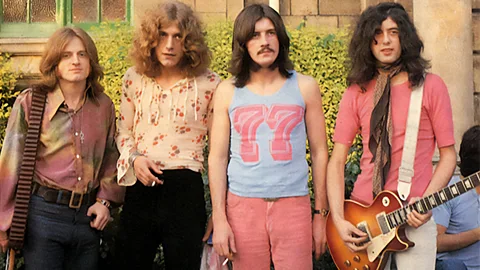 Sony Pictures Classics
Sony Pictures ClassicsIn fact, Becoming Led Zeppelin features two hours of painstakingly sourced archive material, personal photos and performance footage (schoolboy Page playing in a skiffle band; teenage Jones as a church organist; both becoming accomplished session musicians on ’60s pop hits) alongside individual new interviews from Page, Plant and Jones. Bonham’s death in 1980 (from pulmonary aspiration after heavy drinking) would lead to the band’s split – yet he is also surprisingly present here, sounding jovially down-to-earth on a previously unheard audio recording.
As a child, MacMahon had “discovered” Led Zeppelin via a book charting the band’s rise to fame. “It felt like the American Epic stories, in that it’s very relatable: these are four kids, pursuing this dream, and trying to find their way through the music business,” he grins. “I thought it was a wonderful, almost Arthurian story.” This fantastical spirit is echoed in the film, when Page likens his guitar to Excalibur, the mythical sword.
Music as a revelatory force
While the “untold story” is steered by the band members’ anecdotes, they’re not strictly the easiest interviewees – though perhaps this perception is based on my own surreal experience interviewing Page and Plant, when I was a gauche young journalist; they cheerfully shrugged off questions while pouring me cups of tea. Ultimately, it is the music that really speaks volumes. Becoming Led Zeppelin pays testimony to music as a revelatory force, for both fans and performers; octogenarian Page is wide-eyed as he relates first hearing US R&B and soul (“It sounded like it was coming from Mars, even though it was coming from Memphis”). The artists’ raw hunger and determination is palpable; we see Plant shape-shift through various looks (mod; “flower power” romantic) before assuming his unmistakeably lithe “rock deity” form in Led Zeppelin – and we watch the band play their hearts out, first commanding fans across Stateside gigs and radio, before their eventual triumphant 1970 “homecoming” show at London’s Royal Albert Hall.
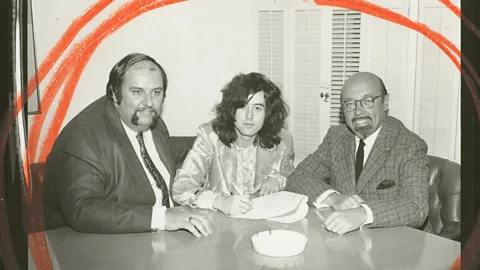 Photo by William Popsie/ Sony Pictures Classics
Photo by William Popsie/ Sony Pictures Classics“We used lots of cinematic techniques to take the viewer back in time,” says McGourty. “And we use the song lyrics to propel you forward; when they go to Atlantic Records, we’re hearing Your Time Is Going To Come; when Robert [Plant] talks about flying across America, we’re hearing Ramble On; and when they’re playing these early shows in Europe and nobody is really getting it, they’re performing Communication Breakdown.”
Indeed, there is brilliant early footage from a French TV show, Tous En Scene, where Led Zeppelin are riotously rocking in front of clearly nonplussed studio audience, comprising prim adults and children with their fingers in their ears. Later, we hear the inception of one of their most famous tracks, 1969’s Whole Lotta Love (furiously catchy, despite Page’s aversion to pop), and see extended performance clips including the 1970 Bath Festival – all incandescent, electric and floridly colourful. You get some sense of the intoxicating atmosphere that would even prompt cult novelist William Burroughs to liken a Led Zeppelin performance (in the US in 1975) to: “the trance music found in Morocco, which is magical in origin and purpose – that is, concerned with the evocation and control of spiritual forces.”
“If you’re making a film about music, then music is the central character, and the viewers – particularly 100 years from now – have got to hear for themselves what this music is,” says MacMahon.
Music writer, Mojo magazine Contributing Editor, broadcaster and producer Phil Alexander has worked closely with Page, Plant and Jones, and points out why Led Zeppelin’s “kinetic energy” remains vital:
“Led Zeppelin are not best mates; it’s really obvious in the film,” Alexander tells the BBC. “Their camaraderie stems from being on stage, and playing off each other. That pure musicianship is what carries them as people – and what they create as a four-piece cannot be replicated.
“If anybody across any generation listens to that band – especially now, when you can discover them at the click of a button – you fall into a world that doesn’t look or sound like anything else. I think most bands of their generation sound like they are of a time; with Led Zeppelin, there is a nowness in how they are, musically. I don’t know how many times I’ve listened to all their albums, and I still find things that make me think: did I hear that before?”
Becoming Led Zeppelin vividly presents the band’s origin story “in the moment”; events unfold chronologically, without hazy nostalgia or foreshadowing of what’s to come. The “untold” tale is also undeniably incomplete; the film ends after the release of the band’s second album, when they have scaled the heights of fame – and before things have spiralled into destructive hedonism. Despite Plant briefly mentioning “girls and drugs”, the account feels unusually wholesome. It is a stark contrast to the tabloid accounts of their debauchery – most notoriously, the grimly salacious (which band members have repeatedly dissociated themselves from) band biography Hammer of the Gods, by Stephen Davis. This feels very deliberate; just as American Epic has been added to educational curricula in the US, Becoming Led Zeppelin is pitched at all ages – with the band not only preserving their legacy, but owning their narrative.
“Despite all the things you’ve read about the ’70s, you don’t get to that place without being incredibly focused,” says MacMahon. “The higher purpose of this film is to tell young people: if you have a passion, and you work hard at your craft and persevere, then you can achieve those dreams. You kind of pick up these lessons as you go on the journey with them. These are the only guys that knew and saw what was happening.”
Becoming Led Zeppelin is in UK cinemas and on limited release in the US now – it goes on wide release in the US on 14 Feb.

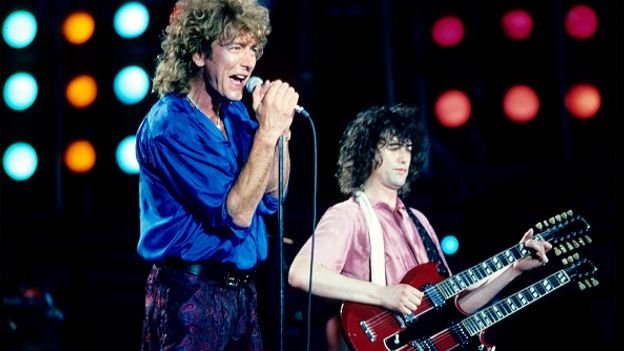

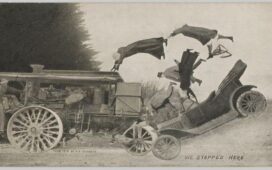
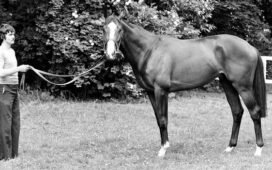
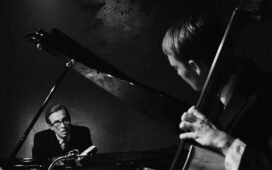

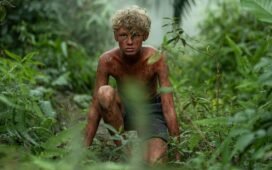
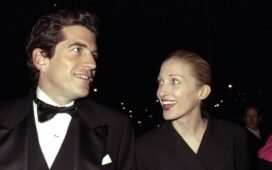
Recent Comments